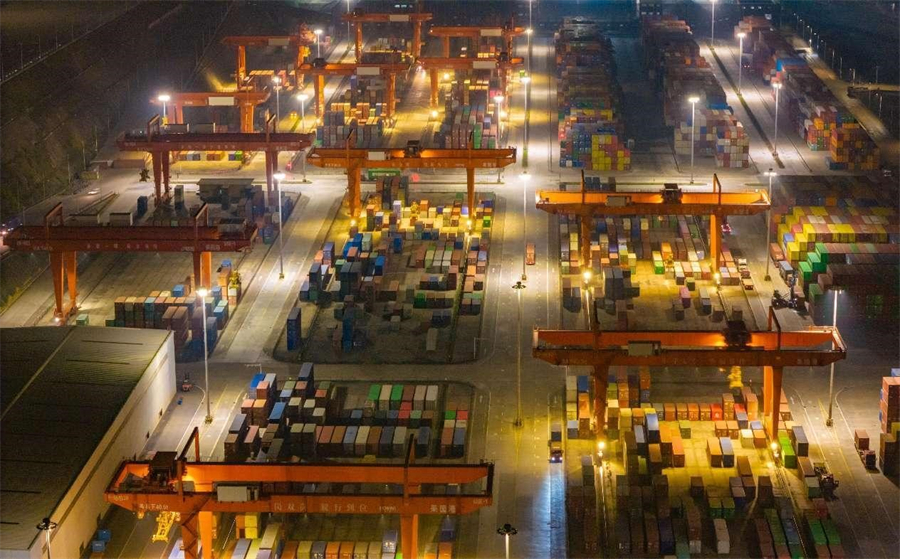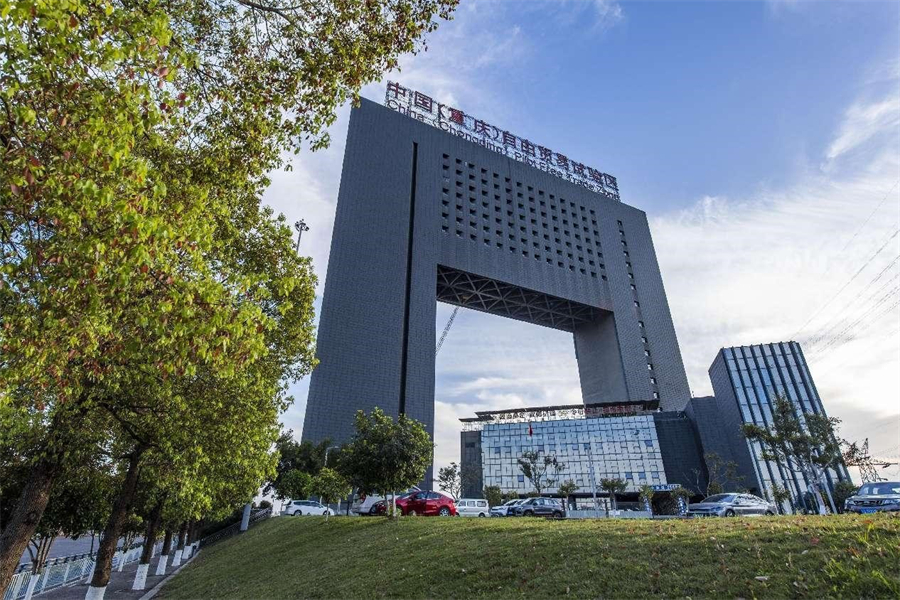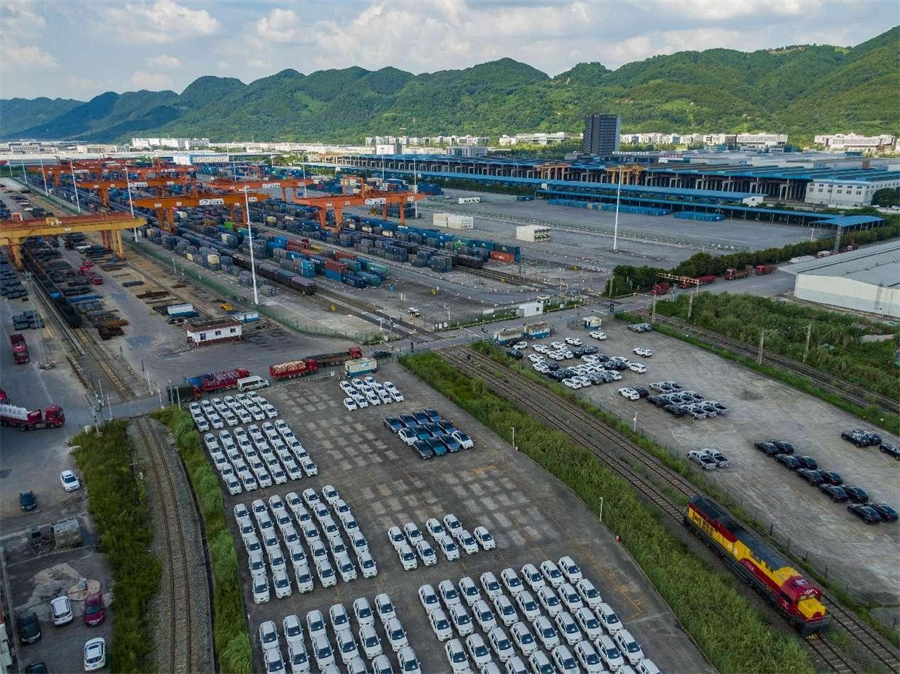China (Chongqing) Pilot Free Trade Zone supports Chongqing in building hub for inland opening-up
Located at the junction of the Belt and Road and the Yangtze River Economic Belt, Chongqing municipality is a key strategic fulcrum for the development of China's western region.
The China (Chongqing) Pilot Free Trade Zone (hereafter referred to as "Chongqing FTZ") was established in 2017. Despite occupying only a thousandth of Chongqing's total area, it has gathered over 190,000 enterprises, including more than a quarter of the municipality's foreign trade companies, which contribute to about 70 percent of the municipality's total foreign trade volume.

Photo shows a night view of a container terminal of the Guoyuan Port in southwest China's Chongqing municipality. [People's Daily Online/Li Hongbo]
One of the key characteristics of the Chongqing FTZ is its focus on institutional innovation. It has issued the multimodal transport bill of lading developed by China International Freight Forwarders Association in an attempt to pilot a "single bill of lading" model for rail-sea intermodal transportation. Besides, it provides application scenarios on its cross-border financial blockchain service platform for financing and settlement along the New International Land-Sea Trade Corridor (ILSTC), facilitating enterprises' freight settlement, trade settlement and financing with a total value of over $3.3 billion.
Since its inauguration, the Chongqing FTZ has worked to align its policies with high-standard international economic and trade rules, steadily advancing institutional opening-up.
With a long blast of whistle, a China-Europe freight train loaded with cars slowly pulled out from the Yuzui freight station of Chongqing. Launched by the Guoyuan Port to pilot the multimodal cross-border train services for finished cars, the train exits China through the Horgos Port in northwest China's Xinjiang Uygur autonomous region. It has opened up an efficient and convenient international logistics channel for automakers in Chongqing and its surrounding areas.
The train leaves China in about five days from its departure, which is twice as fast as sea transportation, said Xu Hao, manager of the overseas business development division of Chinese automobile manufacturer Changan Auto, adding that this multimodal logistics model helps the enterprise expand the overseas market.
Vehicle brands independently owned by Changan Auto shipped over 100,000 vehicles overseas in the first three months of this year, an increase of 80.1 percent year on year.

Photo shows the Xiyong section of the China (Chongqing) Pilot Free Trade Zone. [People's Daily Online/Sun Kaifang]
In the first quarter of 2024, Chongqing's auto exports totaled 8.92 billion yuan, up 24.1 percent year on year. In particular, the exports of electric vehicles reached 14,000 units, with a year-on-year growth of 219.4 percent in terms of value.
After settling in the Xiyong Comprehensive Bonded Zone of the Chongqing FTZ, Hewlett-Packard Company experienced the convenience of shipping products through intercontinental railway.
China-Europe freight trains and freight trains of the ILSTC have cheaper fare than air transportation and higher efficiency than sea transportation, thus significantly lowering the logistics cost for enterprises.
Because of this, Hewlett-Packard Company has constantly expanded its production in Chongqing. It has manufactured 400 million computers in the municipality.
"Thanks to China-Europe freight trains and freight trains of the ILSTC, the Chongqing FTZ can provide solid logistics support for enterprises and introduce more products to the world, thus achieving a virtuous circle of development in which transportation corridors facilitate logistics, logistics promotes economy and trade, and economy and trade drives industrial development," said Wang Xin, director of the Chongqing FTZ institutional innovation department of the Chongqing Municipal Commission of Commerce.

Vehicles to be shipped are parked in an international logistics park in Shapingba district, southwest China's Chongqing municipality. [People's Daily Online/Sun Kaifang]
With two laptops being manufactured per second, Chongqing contributes to almost one-third of the world's laptop production, becoming a key global hub for laptop manufacturing in just a few years. This giant leap couldn't have been made without the improvement of government services in the Chongqing FTZ.
"Nearly 1,000 material codes need to be documented for a single laptop computer, a task that previously demanded customs officers to manually review and file each one separately, leading to a huge workload," said Cao Huawu, deputy head of the Xiyong Customs, a subsidiary of Chongqing Customs.
"We provide proactive services that allow enterprises to file independently, set their own write-off periods, and engage in self-declaration and self-tax payment, which improves the whole procedure to the greatest extent," Cao added.
Tech-Front (Chongqing) Computer Co., Ltd. is one of the beneficiaries. "Now with just a click of the mouse, we can file on our own," said Liu Hongliang, the company's manager. According to him, the company has increased its efficiency in importing and exporting goods by approximately 20 percent.
The Chongqing FTZ has been developing an open industrial system to gather modern factors in recent years, including intelligent manufacturing equipment, new energy and intelligent connected vehicles, cloud computing, big data, consumer finance, international exhibitions, and cross-border e-commerce, supporting Chongqing in its endeavor to build a hub for inland opening-up.
























